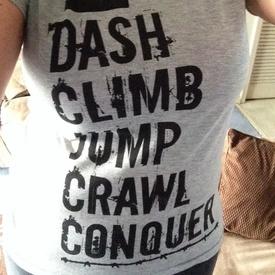Fact or Not

SexyCook
Posts: 2,249 Member
I am Curious....Ok I do know that we all are different heights, frames, sizes, weight and all that good stuff...So if we take 10 people with all these different factors and we all do the same workout we will recieve different calories burn...I know this..My question will the lower in weight person have less than a burn than heavier people. Is the statement TRUE that if your burn is lower than you are in Better Shape? Just looking for what people think. I have no clue and wondered if anyone else knew..THANKS
0
Replies
-
Well, yes, to an extent. If you have more weight to move around, then it will need more calories to shift it!0
-
sounds like we should do an experiment.0
-
http://www.braydenwm.com/calburn.htm This is what I use to calculate my calories based upon my HRM since mine doesn't calculate for me.
Play with the numbers and see for yourself.
I believe that as you get more fit, you have to work harder to burn more calories. But you also have the ability to do so.0 -
It is a proven fact that a person who is more overweight than someone who is closer to his/her recommended weight, does burn more calories. I have noticed that when I started doing Zumba, my calorie burn was over 600 calories in an hour. Now that I am 146, my calorie burn is in the low 500's or the high 400's. I have to workout longer to get a higher burn.0
-
True. If two people took a walk together - same distance, same speed, the 'larger' would burn more calories. I've notice as I've lost weight and become more fit, I burn fewer calories doing the same workout. I know for a fact because my heart rate monitor tells me so.0
-
I totally want to buy a HRM and do an experiment! :glasses:0
-
well just imagen doing a skinny person doing a work out and then another skinny person with a 50lbs back pack on, who would burn more?0
-
Yes, a heavier person doing the same workout will burn more calories. It's takes more energy to carry 250 lbs than it does to carry 120 lbs.0
-
i know that a heavier person burns more than a *less heavy* person... but i don't know about the "in better shape" part... girl, you know i struggle to get a good burn, it sucks that i can't pull the same #'s as my high cal burning pals
 ... but i'm trying
... but i'm trying  0
0 -
YOU guys have made me feel SO SO MUCH Better!! I mean its not fun to be Overweight:grumble: but at least I know I am not doing something wrong with my HRM....Whew but i am going to read up on it...Doing a challenge and I am getting the MOST BURNS GO FIGURE:ohwell:0
-
Yes, the heavier you are the more calories you burn through combustion than a lighter person. So in theory a lighter person would have to work harder to burn the same amount of calories.
However, since your body is hopefully leaner at your lower weight, it should be more efficient at burning calories also.
And..... Deep breath. You should not be consuming as many calories at a lighter weight, so there is no need to burn as many calories as you used to.0 -
Yes, the smaller you are, the less calories you burn. I think that's why in the beginning of weight loss, you lose weight quickly, but the smaller you get, the harder it is to lose b/c your body is adapting to your eating and workouts. The more healthy you get the more efficient your body works. You will probably notice workouts that had you out of breath, now seem easier. It's because your body has adapted. Another reason we have to constantly challenge our bodies. Especially as you get smaller.0
-
Yes it is true. When I started this journey at 242pds I would burn at 1000 calories or more doing one exercise program. Since I have gotten smaller and closer to my ideal weight I have to push myself harder and double up on working out to get a high burn or to burn more calories. My weight loss has slaow down as well, when I first started the weight was just melting off and it takes forever to lose 2ods. For all of these reasons is why I do the advance level with weights of jillian michaels.0
-
Well I believe everyone has answered the weight portion of the question...but it also takes in account your Heart Rate in proportion to your weight.
So hypothetically if someone were 155 pounds and began an extreme workout and burned 650 calories. By the end of two weeks with no weightloss the person will probably burn 500 calories with the same workout and intensity. That is because that person will be becoming more conditioned.
Now as they lose weight and enter in the new weight it will give a lesser burn rate but if they step it up again they can get higher burns again.
Sorry a mouth full.....0 -
Well I believe everyone has answered the weight portion of the question...but it also takes in account your Heart Rate in proportion to your weight.
So hypothetically if someone were 155 pounds and began an extreme workout and burned 650 calories. By the end of two weeks with no weightloss the person will probably burn 500 calories with the same workout and intensity. That is because that person will be becoming more conditioned.
Now as they lose weight and enter in the new weight it will give a lesser burn rate but if they step it up again they can get higher burns again.
Sorry a mouth full.....
If the person does the same workout (intensity) and weighs less, they will burn fewer calories (because of the reduced mass).
If the person does the exact same workout (intensity) and weighs the same, they will burn the same amount of calories, regardless of their conditioning. Heart rate may be lower and it will feel easier because the absolute intensity represents a smaller percentage of their maximum, but the calorie burn stays the same. That's because calorie burn is a function of the absolute intensity of the exercise, not the relative intensity.
A HRM will show a lower calorie burn, but that's an error in the HRM--the actual calorie burn has not changed.0 -
I can do the same thing as a friend who is thicker & she will lose weight & I don’t. I have to work 4 times as hard & it seems so unfair.0
-
I don't think they're necessarily "in better shape", because I know plenty of skinny people who have absolutely no muscle tone, but it is true, the heavier you are, the more calories you will burn.0
-
99% of the time, yes... it's true.
The exception would be if the heavier person were really good/strong at the given activity, while the lighter person was doing it for the first time. The heavier person's body *could* be so trained/accustomed to the activity that it's actually less work than it is for the lighter person who is just starting out.0 -
When you have high calories burned that means your getting a great response from your body. The more your body gets used to doing the same thing, the less you will burn. When you cause muscle confusion, your body doesn't know what to do; therefore you will burn more calories when your doing something different all of the time. That's why when you're at the gym, you should never stay on one machine to long because it will end up being less effective. If I were you, I would be pretty darn happy
 0
0 -
Is the statement TRUE that if your burn is lower than you are in Better Shape? Just looking for what people think. I have no clue and wondered if anyone else knew..THANKS

False. It's a logical fallacy. The only thing that causes your calorie burn to be lower is your weight. It has nothing to do with fitness level. 2 people that weigh the same, but have different levels of fitness, will burn the same amount of calories doing the same exercise.0 -
When you have high calories burned that means your getting a great response from your body. The more your body gets used to doing the same thing, the less you will burn. When you cause muscle confusion, your body doesn't know what to do; therefore you will burn more calories when your doing something different all of the time. That's why when you're at the gym, you should never stay on one machine to long because it will end up being less effective. If I were you, I would be pretty darn happy

That sounds plausible when you are giving your spiel on an infomercial, however it doesn't match how the body actually works.
"Muscle confusion" is marketing gibberish.
While it is necessary to vary your training stimulus, randomly changing activities to "confuse" your body will result in fewer calories burned, not more.
The training stimulus can be varied while still continuing to do the same activity. Doing a mixture of endurance runs, tempo runs and hard intervals on a treadmill will increase your fitness level, allowing you to work harder--and thus burn more calories.
Changing from a treadmill to a bike to a cross trainer to a kickboxing class will not have as great an effect -- until you become proficient enough at ALL the activities to work at the same relative intensity.
An untrained person who keeps switching activities will take longer to reach a level of effective proficiency. And the "inefficiency" will prevent the person from pushing themselves hard enough or long enough to equal the calorie burn of the activity they were used to doing.
Mechanical efficiency has only a very small effect--3%-5% at most. And the result of the efficiency is not that you burn fewer calories, but that you are able to work harder with the same effort -- thus offsetting the tiny decrease that comes from the increased efficiency.0 -
smaller person = smaller burn.
No, the 6'3, 250 lb. man taking my spin class who burns twice as much as I do is probably not more fit than I am. Only a few of them are.
blessings.0 -
Its the freaking small people curse.0
-
Well if certainly works for me! I know that you have fitness background from a hospital but I've been working extensive with body builders and PT for a fitness model competition and for everyone of those it seems to work especially for me so....0
-
Well if certainly works for me! I know that you have fitness background from a hospital but I've been working extensive with body builders and PT for a fitness model competition and for everyone of those it seems to work especially for me so....
For discussion's sake, unless you are doing a controlled study, it is possible to draw the wrong conclusions. Just because you do "A" and "B" happens does not mean that "A" caused "B"--the two things can easily be coincidental.
That's why personal anecdotes have little value as "proof" of any principle. I am assuming by your comment that by "it" you mean some type of "muscle confusion" strategy. First of all, we have to look at exactly what exercise activities you are doing, what duration, what sequence, what intensity, etc. There are any number of things that could be contributing to your results. P90X, for example, "works" for a lot of people--but not because of "muscle confusion". If it works, it does so because it's essentially a higher/high-intensity circuit interval program. The fact that it dresses itself up what I consider gobblegdygook doesn't mean it can't be effective.
You are training at what I would think is a high level for competition purposes. The specific demands of that discipline might require that you do a variety of activities. It may be that it is necessary for you to do a lot of different activities in order to avoid overtraining and to handle the high volume of training you are doing. That's a completely different subject.
I think some confusion results some people are mixing up things like "varying the training stimulus" and "cross training" with 'muscle confusion". The first two are well-validated training principles. My only disagreement is with the definition of "muscle confusion" as: "the principle of frequently changing activities in order to 'confuse' the body into burning more calories".
Physiologically, that's just not true. So, if "it" is "working for you", that's great--but "it" is not "muscle confusion".
Sometimes, this is just a fun discussion about semantics. I certainly am not challenging any of your specific training routines--whatever it's called, you are obviously working hard to achieve an important personal goal. I wish you the best of luck and success!!0 -
true0
This discussion has been closed.
Categories
- All Categories
- 1.4M Health, Wellness and Goals
- 398.2K Introduce Yourself
- 44.7K Getting Started
- 261K Health and Weight Loss
- 176.4K Food and Nutrition
- 47.7K Recipes
- 233K Fitness and Exercise
- 462 Sleep, Mindfulness and Overall Wellness
- 6.5K Goal: Maintaining Weight
- 8.7K Goal: Gaining Weight and Body Building
- 153.5K Motivation and Support
- 8.4K Challenges
- 1.4K Debate Club
- 96.5K Chit-Chat
- 2.6K Fun and Games
- 4.8K MyFitnessPal Information
- 12 News and Announcements
- 21 MyFitnessPal Academy
- 1.6K Feature Suggestions and Ideas
- 3.2K MyFitnessPal Tech Support Questions



















